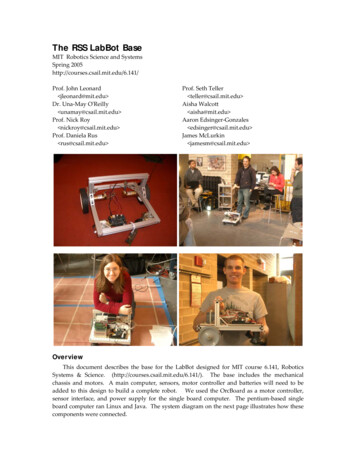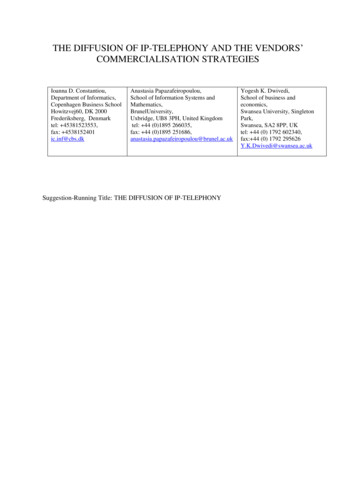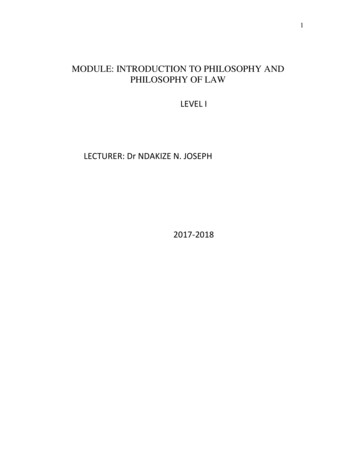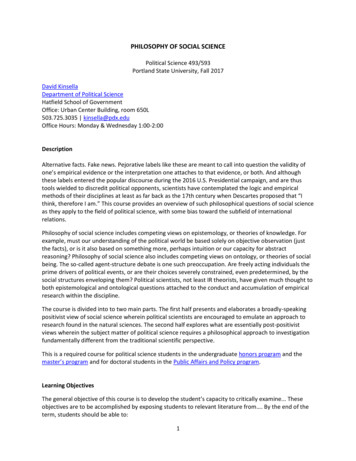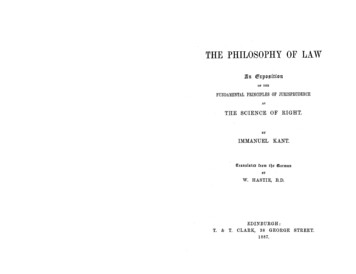
Transcription
THE PHILOSOPHY OF LAWanExpirlsitiirnOF TBEFUNDAXENTAL PRINCIPLES OF JURISPRUDENCEArTHE S C I E N C E OF RIGHT.BYIMMANUEL KANT.E r a n s I a t e b from tbe G e r m a aBYW. HASTIE, B.D.EDINBURGH :T. & T. CLARK, 38 QEORGE STREET.1887.
TRANSLATOR'S PREFACE.'But next to a new i s t o & of Law, what we most require is anew Philosophy of faw.'-SirHENRYSUMNEMAINE. KANT'SScience of Riyht ' is a complete exposition of theYhilosophy of Law, viewed as a rational investigation ofthe fundamental Principles of Jurisprudence. It waspublished in 1'796,2as the First Part of his Metaphysicof Mo nls: the promised sequel and completion of theFoundation for a ilfetaphysic of Movals published in1'785. The irnportance and value o the great thinker'sexposition of the Science of Right, both as regards thefundamental Principles of his own Practical Philosophyand the general interest of the Philosophy of Law, wereat once recognised. A second Edition, enlarged by anRechtslehre.It appeared soon after Michaelmas 1796, but with the year 1797 onthe title-page. This has given rise to some confusion regarding the dateof the first Edition, which is now usually quoteri as 1796-7. (Schubert,Kant's Werke, Bd. ix. viii., and Biographie, p. 145.)* Die Metaphysik der Sitten. Erster Theil. Metaphysische Anfangsgründe der Rechtslehre. Köriigsberg, 1797.4 Grundlegung zur Metaphysik der Sitten.Translated by Willich(1798), Semple (1836), and Abbott (1873).1
viKANT'S PHILOSOPHY OF LAtKAppendix, containing Supplementary Explanations of thePrinciples of Right, appeared in 1'798? The work hassince then been several times reproduced by itself, aswell as incorporated in all fhe complete editions ofKant's Works. I t was immediately rendered into Latinby Born in 1'798, and again by König in 1 800. I twas translated into French by Professor Tissot in 1837:of which translation a second revised Edition hasappeared. It was again translated into French by M.Barni, preceded by an elaborate analytical introduction,in 1853.5 With the exception of the Preface andIntroductions,G the work now appears translated intoEnglish for the first time.Kant's Science of Rig7bt was his last great worlr of anindependent kind in the department of pure Philosophy,These Siipplementary Explanations were appended by Kant to thePirst P a r t of the work, to which most of their detail more directlyapply ; but they are more conveniently appended inthis translation to thewhole work, an arrangement which has also been adopted by the otherTranslators.Initia Metaphysica Doctrine Jiiris. Immanvelis Kantii Opera adphilosophiam criticam. Latine vemt Fredericus Gottlob Born. Volumenqrrartum. Lipsie, MDCCLXXXXVIII.Elementa Metaphysica Juris Doctrine. Latine vertit G. L. König.Amstel. 1800, 8. (Warnkonig and others erroneoiisly refer it to Gotha.)Principes Mhtaphysiques du Droit, par Emm. Kant, etc. Paris, 1837.Elements Mhtaphysiques de la Doctrine du Droit, etc. Paris, 1853.G The Preface and the Introductions (infra, pp. 1-58, 259-265) havebeen translated by Mr. Semple. See The Metaphysic of Ethics bgTRAXSLATOR'S PREFACE.viiand with it he virtually brouglit his activity as a masterof thought to a close? It fittingly crowned the, richpractical period of his later philosophical teaching, andhe shed into it the last effort of his energy of thought.Full of years and honours he was tlieii deliberatelyengaged, in the calm of undisturbed and unweariedreflection, in gathering the finally matured fruit of allthe meditation and learning of his life. His threeimmortal Critiques of the P u eReason (1 '78 I), t7 ePractical Reason (1 7 8 B), and the Judgment (1 '7 9 O),had unfolded all the theoretical Principlee of his CriticalPhilosophy, and established his clain to be recognised ,asat once the most profound and the most original thinlcerof the modern world. And as the experience of lifedeepened around and within him, towards the sunset, hislmrnanz elKant, translated by J. W. Semple, Advacate. Fourth Ed.Edited with Introduction by Rev. Henry Calderwood, LL.D., Professorof Moral Philosophy, 'University of Edinburgh. Edin. : T. & T. Clark,1886.-These are indispensable parts of the present work, but they havebeen translated entirely anew.1 He ceased lecturing in 1797 ; and the only works of any iniportancepublished by himself subsequent to the Rechtslehre, were the Meta.physische A lfangsgründeder Tugendlehre in 1797, and Der Streit derFacultäte ,and the Anthropologie in 1798. The Loyik was edited byJLche in 1800 ; the Physische Ceographk by Rink in 1802, and thePädagogik, also by Rink, in 1803, the year before Kant's death.Kritik der reinen Vernunft. Translated anew by Max Miiller (1881).3 Kritik der praktischen Vernunft. Translated by Abbott.4 Kritik der Urthcilskraft. Translated into French by M. Bariii.'
viiiKANT'S PHILOSOPHY OF LAW.interest had been more and more absorbed and concentrated in the Practical. For to him, as to all great andcomprehensive thinkers, Philosophy has only its beginningin the theoretical explanation of things ; its chief end isthe rational organization and animation and guidance ofthe higher life in which all things culminate. Kant haclcarried with him through all his struggle and toil ofthought, the cardinal faith in God, Freedom, and Immortality, as an inalienable possession of Reason, and he hadbeheld the human Personality transfigured and glorifiedin tbe Divine radiance of the prinial Ideas. But he hadfurther to contemplate the common life of Humanity inits varied ongoings and activities, rising with the innateright of mastery from the bosom of Nature and assertingits lordship in the arena of the mighty world that itincessantly struggles to appropriate and subdue toitself. I n the natural chaos and conflict of thesocial life of man, as presented in the multitudinousand ever-changing mass of the historic organism, hehad also to search out the Principles of order andform, to vindicate the rationality of 'the ineradicablebelief in human Causation, and to quicken anew thelively hope of a higher issue of History. The age of theRevolution called and inspired him to his task. Withkeen vision he saw a new world suddenly born beforehim, as the blood-stained product 6f a motion long toiling inthe gloom, and all old things thus passing away ; and heknew that it was only the pure and the practical Reason,in that inrnost union which constitutes the birthright ofFreedom, that could regnlate and harmonize the futureorder of this strongest offspring of time. And if it wasnot given to him to work out the whole cycle of thenew rational ideas, he at least touched upon them all,and he has embodied the cardinal Principle of theSysiem in his Science of Right as the philosophicalMagna Charta of the age of political Reason and thepermanent foundation of all true Philosophy of Law.Thus produced, Kant's Science of Right constituted anepoch in jural speculation, and it has commanded thehomage of the greatest thinkers since. Fichte, withcharacteristic ardour and with eagle vision, threw hiswhole energy of soul into the rational problem of Right,and if not without a glance of scorn at the sober linxitations of the ' old Lectures ' of the aged professor, he yetacknowledges in his own more aerial flight the initialsafety of this more practical guidance.' I n those earlydays of eager search and high aspiration, Hebel, stirredto the depths by Kant, and Fichte, and Schelling, wrotehis profound and powerful essay on the Philosophy of1 Fichte's Nachgelassene Werke, 2 Bd. System der Rechtslehre (1804),198, eto. (Bonn, 1834.) Fichte's Grundlage des Naturrechts (1796),as hehimselfpointsout, was publisliedbefore Kant's ]Rechtslehre,butits principlesare all essentially Kantian. (Translated by Kroeger, Philadelphia, 1870.)
Right, laden with an Atlantean burden of thought andstriined to intolerable rigidity and severity of form, buthis own highest achievement only aimed at a coinpleterintegration of the Principles differentiated by Kant.' I twas impossible that the rational evangel of universalfreedom and the seer-like vision of a world, hithertogroaning and travailing in pain but now struggling intothe perfection of Eternal Peace and Good-will, shouldfind a sympathetic response in Schopenhauer, notwithstanding all his admiration of Kant ; biit the racycynicism of the great Pessimist rather subsides beforehim into mild lamentation than seeks the usual refugefrom its own vacancy and dospair in the wilful causticof scorching invective and reproach? Schleiermacher,the greatest theologian and moralist of the Century, earlydiscer ledthe limitations of the b priori formalism, andsupplemented it by the comprehensive conceptions of theprima1 dominion and the new order of creation, but heowed his critical and dialectical ethicality mainly toKanL8 Krause, the leader of the latest and largest1 Hegel's Werke, Bd. i.Philosophische Abhandlungen, iv. Uebertlie Wissenschaftlichen Behandlungsarten des Natzbrrechts (1802-3) ;and the Grundlinien der Philosophie des Rechts, oder Naturrecht undStaatswissenschaft im Grundrisse (1821). Werke, Bd. viii. (passim).Dr. J. Hutchison Stirling's Lectures on the Philosophy of Law present amost incisive and suggestive introduction t o Hegel's Philosophy of Right.Die beiden Grundprobleme der Ethik (1841), pp. 118-9.Grundlinien einer Kritik der bisherigen Sittenlehre (1803). Entwurftliought in this sphere-atonce intuitive, radieal, andproductive in his faculty, analytic, synthetic, and o r p i cin his method, and real, ideal, and historic in his product-caught again ths archetypal perfectibility of the humanreflection of the Divine, and the living conditions of thetrue Progress of humanity. The dawn of the thought oftlie new age in Kant rises above the horizon to theclear day, full-orbed and vital, in Krause? All thecontinental thinkers and schools of the century in thissphere of Jurisprudence, whatever be their distinctivecharacteristics or tendencies, have owned or manifestedtheir obligations to the great master of the CriticalPhilosophy.eines Systems der Sittenlehre, herausg. von A. Schweizer (1835). Gmndriss der philosophischen Ethik, von A. Taesten (1841). Die Lehre vomStaat, herausg. von Ch. A. Brandes (1845).Grundlage des Naturrechts (1803). Abriss des Systems der Philosophie des Rechts oder des Naturrechts (1828). Krause is now universally recognised as the definite founder of the organic and positive &hoolof Natural Right. His principles have been ably expoiinded by his twonlost faithful followers, Ahrens (Cours de Droit Naturel, 7th ed. 1875)andRoder (Urundzüge des Naturrechts o. der Rechts loso e, 2 Auf. 1860).Professor J. S. del Rio of Madrid has vividly expounded and enthusiasticallyadvocated Krause's System in Spanish. Professor Lorimer of the Edinburgh University, ivhile maintaining an independent and critical attitudetowards the various Schools of u r i s i d e n cise , in close sympathy withthe Priiiciples of Krause (The Institutes of Law : a Trentise of the Principles of Jurisprudence as determined by Nature, 2nd ed. 1880, and TheInstitutes of the Law of Nations). He has clearly indicated his agreementwith the Kantian School, sofar as its p'nciples go (Instit. p. 336, n.).
xiiiKANT'S PHILOSOPHY OP LAW.TRANSLATOR'S PREFACE.The influence of the Kantian Doctrine of Right hasthus been vitally operative in all the subsequent Progressof jural and political science.' Kant, here as in everyother department of Philosophy, summed up the fragmentary and critical movement of the EighteenthCentury, and not only spoke its last word, but inaugurated a method which was to guide and stimulate thehighest thought of the future. With an unwontedblending of speculative insight and practical knowledge,an ideal universality of conception and a Sure grasp ofthe reality of experience, his effort, in its inner depth,vitality, and concentration, contrasts almost strangelywith the trivial formalities of .the Leibnitzio-WolffianRationalists on the one hand? and with the pedantict,ecliousness of tlie Empiricists of tlie School of Grotiuson the 0ther.l Tliomasius and his School, the expoundersof the Doctrine of Rigllt as an independent Science,were the direct precursors of the formal method ofIS;antJs System.2 Its firm and clear outline iniplies tliesubstance of rna;ny an operose and now almost unreadwith the quick,-able tome ; and it is alive throughoutKant'sunrivalledkeen spirit of tlie modern world.genius for distinct division and systematic form, foundfull and appropriate scope in this sphere of thought. HexiiThis applies to the latest Gernan discussions and doctrines. Thefollowing works may ba referred to as the most important recent contributions, in addition to thore mentioned above (such as Ahrens and Roder,xi. n.) :-Trendelenburg, Naturrecht auf dem Grunde der Ethik, 2 Auf.1868. Post, Das Naturgesetz des Rechts, 1867. W. Arnold, Cultur undRechtsleben, 1865. Ulrici, Naturrecht, 1873. Zoepfl, Grundriss zuVorlesungen über Rechtephilosophie, 1878. Rudolph von Ihering, DerZweck im Recht, i. 1877, ii. 1883. Professor Frohschammer of Munichhas discussed the problebo of Right'in a thoughtful and.suggestivewayfrom the standpoint of his original and interesting System of Philosophy,in his new volume, Ueber die Organisation und Cdtur der menschlichenCe eUschaft, Philosophische Untersuchungen über Recht und Staat,sociales Leben und Erziehung, 1885.Leibnitz, Nova Uethodus discendrie docendzeque Jurisprudentia, 1767.Observationes de principio Juris. Codex Juris Gentium, 1693-1700.Wolff, Jus Natum Methodo Scieiitifica pertractatiim, Lips. 8 Tomi.-1740-48. Institutioncs Juris Nature et Gentium, Hala, 1754. (InFrench by Luzccc, Amsterdam, 1742, 4 vols.) Vernünftige Gedanken.Vatel, Le Droit des Gens, Leyden, 1758. Edited by Royer-Collard,Paris, 1835. English translation by Chitty, 1834. [For the other workvof this school, see Ahrens, i. 323-4, or Miller's Lectures, p. 411.1Grotius, De Jure Belli ac Pacis, lib. i i i 1625. Translated hyBarbeyrae iuto French, 1724 ; and by Whewell into English, 1858.Pufendorf, Elementa Juris Universalis, 1660. De Jure Nature etGentiuni, 1672. [English translation by Kennett, 1729.1Cumberlaud, De Legibus Naturzp Disquisitio Philosophica, London,1672. Translated into English by Towers, Dublin, 1750.Cocceji, Grotius illustratus, etc., 3 vols. 1744-7. [See Miller, 409.12 Christian Thomasius (1655-1728) first clearly distinguished betreenthe Doctrine of Riglit and Ethics, and laid the basis of the celebrateddistinction of Perfect and Imperfect Obligations as differentiated by theelement of Constraint. See Professor Lorimer's excellent account ofTliomasius aiid of Kant's relation to his System, Inst. of Law, p. 288 ;and Köder, i. 240. The principal works of this School are : Thomasius,Fundamenta juris nature et gentium ex sensu communi deducta, 1705.Gerhard, Delineatio juris naturalis, 1712. Gundling, Jus Nature. etgentium. Koehler, Exercitationes, 1728. Aclienwall, Prolegomena Jurisnattiiralis, and Jus Natiirix, 1761.'
sivTRANSLATOR'S PREFACE.KANT'S PHILOSOPHY OF LAW.had now all his technical art as an expounder of Pliilosophy in perfect control, and after the hot rush throughthe first great Critique he had leicrned to take his time.His exposition thus became simplified, systematized, andclarified throughout to utmost intelligibility. Here, too,the cardinal aim of his Method was to wed speculativethought and empirical fact, to harmonize the abstractuniversality of Reason with the concrete particularities ofRight, and to reconcile the free individuality of thecitizen with the regulated organism of the State. Andthe least that can be said of his execution is, that he hasrescued the essential principle of Right from the debasement of the antinomian naturalism and arbitrary politicality of Hobbesl as well as from the extravagance of thelnwless and destructive individualism of Rousseau,2 whileconceding and even adopting what is substantially truein the antagonistic theories of these epochal thinkers;and he has thereby given the birthright of Freedomagain, full-reasoned and certiorated, as ' a possession forever' to modern scientific thought. With widest and1 Hobbes, De Cive, 1642. Leviathan seu de civitate ecclesiastica etcivili, 1651. On Hobbes generally, See Professor Croom Robertson'sMonograph in Blackwood's Philosophical Classics.'L'origine et les fondements de l'in6galit6 parmi les hommes, Dijon,1751. Contrat social, 1762. RousSeau's writings were eagerly read byKant, and greatly influenced him. On Rousseau generally, See JohnMorley's Roußseau,Lond. 1878.XVfurthest vision, and with a wisdom iiicomparably superiorto the reactionary excitement of the great EnglishOrator: he looked calmly beyond ' the red fool-fury ofthe Seine' and all the storm and stress of the time, tothe Sure realization of the one increasing purpose thatruns through the ages. The burden of years chillednone- of his sympathies nor dimmed any of his hopes forhumanity; nor did any pessimistic shadow or murmurbecloud his strong poetic thought, or disturb ' themystical lore ' of his eventide. And thus at the close ofall his thinking, he made the Science of Right the verycorner-stone of the social building of the race, and thepractical culminntion of all Religion and all Philosophy.I t is not meant that everything presented here byKant is perfect or firial. On the contrary, there isprobably nothing at all in his whole System of Philosophy-whose predominant characteristics are criticism,initiation, movement -that could be intelligently soregarded ; and the admitted Progress of subsequenttheories of Right, as briefly iildicated above, may beconsidered as conceding so much. It must be furtheradmitted of Kant's Scielzce of Riglzt that it presentsBurke is assigned to the Historical School of Jurisprudence bywho not inaptly designates hin1 'Che Mirabeau of the antirevolution' (i., 53). See the Rejeections on the French Revolution (1790).Stahl gives a high estimate of Biirke as ' the purest representative of1Ahrens,Conservatism.'
TRANSLATOR'S PREFACE.ererywliere abundant opening and even provocation for' Metacriticism ' and liistorical anticriticism, which havecertainly not been overlooked or neglected. But it ismeant withal that the Philosophy of Jurisprudence hasreally flourished in the Nineteenth Century only whereKant's influence has been effective, and that the higheraltitudes of jural science have only come into sightwhere he has been taken as a guide. The great criticalthinlcer sei! the problem of Right anew to the pureSpeculative Reasoi ,and thus accomplished an intellectual transformation of juridical thought corresponding tothe revolutionary enthusiasm of liberty in the practicalsphere. It is only from this point of view that we canrightly appreciate or estimate his influence and significance. The all-embracing problem of the modern metamorphosis of the institutions of Society in the free State,lies implicitly in his apprehension. And in spite of hisnegative aspect, which has sometitnes entirely misledsuperficial students, his solution, although betimes tentative and hesitating, is in the niain faithful to the highestideal of humanity, being foundationed on the eternity ofRight and crowned by the universal security and peaceof the gradually realized Freedom of mankind. As Kantsaved the distracted and confused thought of his timefrom utter scepticism and despair, and set it again withrenewed youth and enthusiasm on its way, so his spiritxviiseems to be rising again upon us in this our hour ofneed, with fresh healing in his wings. Our Jurists musttherefore also join the ever increasing throng of contemporary thinkers in the now general return.to Kant.' Theirprinciples are even more conspicu uslyat hazard thanany others, and the whole method of their science, longdping of intellectual inanition and asphyxia, must seel;the conditions of a complete renovation. I t is oiily thus,too, that the practical Politician will find the guidance ofreal principle in this agitated and troubled age in whichthe foundations of Government as well as of Right areso daringly scrutinised and so manifestly imperilled?and in which he is driven by the inherent necessary1 ' The very cry of the hour is, Fichte and Schelling are dead, and Hegel,if not clotted nonsense, is unintelligible ; let 11s go back to Kant. See,too, in other countries, what a difference the want of Kant has made.'Dr. J. H. Stirling, Hind, No. xxxvi.Witliin the last ten years manyvoices have been heard, both in this country and in Germany, bidding usreturn to Kant, as to that which is alone sound and hopeful in Philosophy; that which unites the prudence of science with the highestspeculative enterprise that is possible without idealistic extravagances.'Professor E. Caird, Jouvnal of Speculative Philosophy, vol. xiv. 1, 126.' From Hegel, we must, I think, still return upon Kant, seeking freshhope for Philosophy in a continued iise of the critical method.' ProfessorCalderwood, Introduction to Kant's Metaphysie of Ethics, p. xix.The Socialistic and Communistic Doctrines of Owen (1771-1858),Fourier (1777-1837), Saint-Simon (1760-1825), Louis Blanc, Proudhon,and Cabet, ' considered as aberrations in the development of Right,' aresketched by Ahrens (i. 3 12) with his characteristic discrimination andfairness. The principles of the coiitemporary English SociaIism will be
xixKANT'S PEILOSOPHY OB LAW.TRANSLATOR'S PKEFACE.implication of local politics to face the inevitable issueof world-wide' complications and the universal probleniof human solidarity. And thus only, as it now appears,will it be possible to find a Principle that will at oncebe true to the most liberal tendency of the time, andyet do justice to its most conservative necessities.Of criticism and comment, blind adulation andunjnst depreciation of Kant's system of Right, therehas been, as already hinted, abundance and even morethan enough. Every philosophical Jurist has had tadefine morc or less explicitly his attitude towards theKantian standpoint. The original thinkers of thedogmatic Schools-Fichte, Schelling,l Hegel, and Krause,-have niade it the starting-point of their special efforts,and have elaborated their own conceptions by positive ornegative reference to it. The recent Theological Schoolof Stahl and Baader, De Maistre and Bonald,' representing the Protestant and Papal reaction from the modernautonomy of Reason, has yet left the Kantian principleunshaken, and has at the best only formulated its doctrineof a universal Divine order in more specific Christianterms. The Historical School of Hugo and Savigny2arid, Puchta,-whichis also that of Bentham, Austinxviiifound sumriied up in A Summary of the Principles.of SocialWm un-ittenfor the Democratic Federation, by H. M. Hyndman and William Morris(1884). Compare also Hyndmau's The Histomcal Basis of Socialism inEngland, and To-day and Jhtice, the Organs of the Social Democracy.' clielling's contributions to the Science of Right have hardlyreceived the attention they deserve. The absorptiou of his thought inthe Philosophy of Nature left him less free to devote himself to theYhilosophy of History, but it is mainly to him that the idea of the'systematic objectivity and the organic vitality of the State, inits latest forms, is due. Hegel and Krause have severally adoptedand developed the two sides of this conception. Compare Schelling'sAbhandlung über das Naturrecht in Fichte und Niethammer's Journal,iv. and v. ; and his Vorlesungen über die Methode des akademischenStudiums, p. 146, etc. See Stahl's excellent account of Schelling'sDoctrine, Philosophie des Rechts, i. 403-14, and The 'Journal ofSpeculative PJ ilosophy,vol. xiii. No. 3, vi., Schelling on History andJurisprudence.'1 Stahl and Baader represent the Neo-Schellingian standpoint in theirpliilosophical doctrines.-F. J. Stahl, Die Philosophie des Rechts, 3 Bde.,3 Auf. 1865 (an important and meritorious werk).-Franz von Baader'sSämmtliche Werke, 16 Bde. 1851-60. (Cf. Franz Hoffmann's Behchtungdes A n & %auf Baader in Thilo's S c h f t: ' Die theologisikende Rechtsund Staatslehre,' 1861.)-Joseph de Maistre, Soirks de St. Petersburg,Paris, 1821. Mdmoires, etc., par A. Blanc, 1858.-L'AbbB de Bonald,Ldgislatimolt primitive, 1821.2 Hugo (1768-1844) is usually regarded as the founder, and Savigny(1778-1861) as the chief representative of the Historical School. Hugo,Lehrbuch des Naturrechts als einer Philosophie des positiven Rechts,1799, 3 Auf. 1820. Frederich Carl von Savigny, Vom Beruf unsererZeit für Gesetzgebung und Recl tswissenschafi,1814 ; System des heutigemRömischen Rechts, 1840. (See Guthrie's translation of Savigny, Treatisc016 the Conflict of Laws, with an excellent Preface. , T. & T. Clark.)The Historical School, as Ahrens shows, must be carried back so asto include such thinkers as Cujas, the great French Jurist of the 16thcentury, who called the History of Right his 'hameqon d'or ;' Montesquieu (1689-1755), whose well-known book, L'Esprit des Lok (1748),ran through twenty-two editions in a few yean ; and the Neapolitan Vico(1688-1744), the founder of the ' New Science' of History. Vico is onlynow becoming properly appreciated. See Professor's Flint's able and
KBKT'S PHILOSOPHY OB LAW.TBANSLATOR'S PREFACE.and Buckle, Sir George C. Lewis and Sir HenrySiimner Maine, and Herbert Spencer,-withall itsapparent antagonism, has only so far supplementedthe rational universality of Kant by the necessaryconnterpart of an historical Phenomenology of the riseand development of the positive legal institutions, asthe natural evolution and verification in experience ofthe juridical conceptions? The conspicuous want of acriterion of Right in the application of the niere his-torical Method to the manifold, contingent, and variable institutions of human society, has been oftenaignalized ; and the representatives of the School havebeen driven again, especially in their advocacy ofpolitical liberalism, upon the rational principles ofFreedom?The Civil Jurists who have carried the unreasoningadmiration of the Roman Law almost to the idolatry ofits letter, and who are too apt to ignore the movementof two thousand years and all the aspirations of themodern R,eason, could not be expected to be found insympathy witli the Rational Method of Kant. Theirmultiplied objections to the details of his expositio i,from Schmitthenner to the present day, are, however,founded upon an cntire misapprehension of the purposeof his form. For while Kant rightly recognised theXXinstructive ' Vico ' in Blackwood's PhilosophicaZ Classics. ' In his work,De universi juris uno principio et ne (1820), Vico divides tlie wholeScience of Right into three parts : (1) the Philosophy of Right, (2) theHistory of Right, and (3) the Art of applying the Phiiosophy to facts.He distinguishes profoundly in Laws the spirit or will of the legislator(mens leg&) and the reason of the 1aw (ratio legis), which consists in theaccordance of a Iaw with historical facts and with the etemal principlesof the Tiue and Good' (Ahrens). The contemporary Historical Schooldoes not yet occupy so philosophicd a position.1 Sir Henry Sumner Maine, the most eminent English representativeof the Historical School, continues to regard ' the philosophy founded ontlie hypothesis of a state of nature ' as ' still the greatest antagonist of theHistorical afethod ' (Ancient Law, pp; 90, 91) ;but thisis evidently said indisregard of the transformation of Roiisseau's theory by Kant, and thecontributions to the application of the Historical Method by Hege1 andhis school, in whose principle the historic evolution is an essentialelement. Sir H. S. Maine's own contributions cannot be too highlyrecommended for their thoroughness and suggestiveness. He has gatheredmuch of his original and pregnant matter from direct acquaintance withIndia, where, as is the case with the forms oP nature, the whole genesisand stratification of the forms of Society are presented livingly to view.(Anctent Law, 1861, 7th ed. 1880. Vil2aye Comnaunities in the Eastaild Wat, 4th ed. 1881. EarZy History of Znstitutions, 1874.)xxi1 Extremes meet in the moral indigerence of the universal naturalismof the ultra-historical School and the abstract absolute rationalism ofSpinoza. I t was Grotius who first clearly distinguished between positivefact aiid rational idea in the sphere of Right, and thus originated themovement of modern 'jural ' speculation. For evidence of the statementin the text, see Bentham's Works, Buckle's History of Civiltation, Mi11on Liberty, aud especially Puchta's Encyclopädie, introductory to hisCursus der Institutionen, 6 Auf. 1865. The standpoint of the HistoricalSchool has been thoroughly reviewed by Stahl, i. 570-90 ; Ahrens, i.51-61 ; and Köder, i. 266-219.' Ueber den Charakter unddie Aufgaben unserer Zeit in Beziehung aiifStaat uild Staatswissenschaft,' Giess. 1832. Zwölf Bücher vom Staate,1839. See Rosenkranz's Geschichte der Kant'sches Philosopl ie,p, 268.
xxiiICANT'S PHILOSOPHY OE LAW.Roman Law as the highest embodiment of the juridicalReason of the ancient world, and therefore expoundedhis own conceptions by constant reference to it, heclearly discerned its relativity and its limitations ; aildhe accordingly aims at unfolding everywhere through itscategories the juridical idea in its ultimate purity. I nXant the juridical Idea first attains its essential selfrealization and productivity, and his system of Privateltight is at orice freer and more concrete than theSystems of Hobbes and Rousseau, because it involvestlie ancient civil system, corrected and modernized byregard to its rational and universal principles. Thisconsideration alone will meet a host of petty objections,and guard the student against expecting to find in thismost philosophical exposition of the Principles of Righta mere elementary text-book of the Roman Law.'In England, Kant's Scielzce of R9ht seems as yet toV
sphere of Jurisprudence, whatever be their distinctive characteristics or tendencies, have owned or manifested their obligations to the great master of the Critical Philosophy. eines Systems der Sittenlehre, herausg. von A. Schweizer (1835). Gmnd- riss der philosophischen Ethik, von A. Taesten (1841). Die Lehre vom
